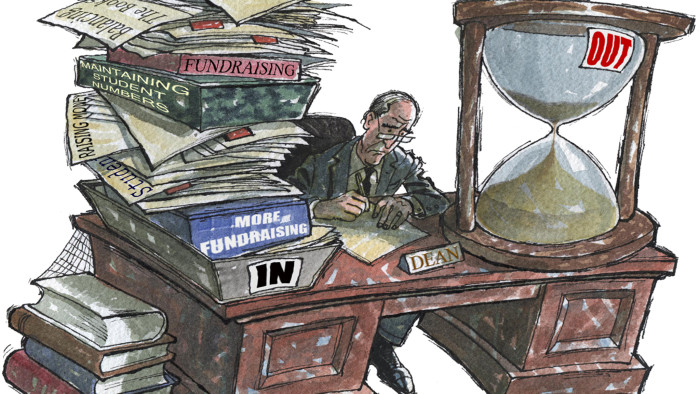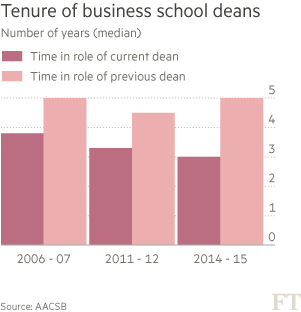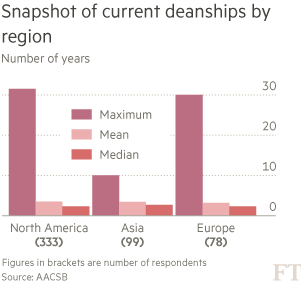Short tenure of deans signals a leadership void

Simply sign up to the Business education myFT Digest -- delivered directly to your inbox.
Shakespeare’s Henry V with his cry of “Once more unto the breach, dear friends” to rally his troops and urge them to fight on is often used as a case study in leadership. So it is perhaps surprising that business schools, which pride themselves on teaching leadership skills, have been so woefully bad at appointing deans who inspire and stay the course.
The statistics tell a sorry tale. Over the past decade most deans in North America have stayed in the job for five years, compared with four in Europe and Asia, according to the AACSB, the business school accreditation body. What is more, a quarter of deans only hold the title for three years or less.
“The length of tenure is decreasing in a world that begs for more leadership and more stable leadership,” says Dan LeClair, executive vice-president for AACSB. Yet most of the 553 deans that responded to the AACSB’s 2014-15 survey were novices. Only half had been in the job for three years or more.
The statistics are little better at elite institutions. Deans of the top 10 schools in the FT’s 2015 Global MBA rankings have been in situ for an average six years. Even these figures are bolstered by just two deans, Jordi Canals, of Iese, dean since 2001, and Glenn Hubbard, who has led Columbia since 2004.
Those trying to explain the short tenure of a modern dean point out that successful leaders are courted by rival institutions and that more deans move between universities than hitherto. Such “serial deans” include Robert Sullivan, at UC San Diego’s Rady school, and Edward Snyder of Yale.

Both have been dean at three different business schools and clearly relish the challenges, but they say the pressures on today’s deans are often problematic.
For Prof Snyder the divergent interests of the various constituencies is one pressure. Professors want long-term research projects paved with resources while students have immediate academic and career needs. Then there are alumni, who want support, recognition and life-long learning.
What is more, he says, there are high expectations placed on many deans. “[Almost] everyone expects their favourite business school to be in the top X, where X is a small number, within Y years, where Y is also a small number.”
Prof Sullivan believes these expectations are compounded in a market where MBA applications are decreasing, especially in universities where the business school is the cash cow.
“Administrations are not used to MBA programmes not growing. It [the dean’s job] used to be honorific, but today it’s a real job and everyone is talking about accountability.”
Shorter tenure means little gets done, he argues. “I think five years is the minimum to have an impact and to leave your mark.”
The UK is proving to be a microcosm of the broader debate. When Sue Cox steps down as dean of Lancaster University School of Management this summer after 14 years, one of the longest-serving deans at an accredited and ranked UK school will be Peter Moizer, who has been dean of Leeds University Business School for seven years.
Slideshow

Learn all you need to know about the deans from top business schools worldwide
He finds the decreasing tenure of deans alarming. “It [the role of dean] is quite a steep learning curve,” he says. “It took me about three years to get on top of it.” Whereas in the corporate world the chief executive’s job is an extension of what has gone before — the finance director or a division head often gets the top job — in a business school the job of the dean is completely different to that of a star professor, he says.
In most cases research and teaching have to give way to fundraising, balancing the books and maintaining student numbers. “As dean you join the dark side,” says Prof Moizer. “You leave the world of academia, and join the world of managers and administrators, and end up with a different set of problems. Suddenly you have to know about it; it’s your job.”
The fact that there are so few long-term deans at UK branded business schools is in sharp contrast to the corporate world, where 25 per cent of the chief executives of the UK’s FTSE 100 companies have held their jobs for a decade or more.
But when practitioners have taken on the role of business school dean their record has been patchy at best. Few executives have made good deans and those that do often hold PhDs. Robert Joss at Stanford and Tom Gerrity at Wharton are two examples — they held doctorates from Stanford and MIT Sloan respectively.
The failure of many corporate deans comes down to the reporting structure in business schools, says Prof Sullivan. “In industry you can make decisions. [In business schools] the faculty don’t necessarily need to listen to you.”

It is not surprising, then, that outside the top handful of big brand business schools there are few qualified applicants. Professors often already have enviable lifestyles, says Jennifer Bol in the New York office of Spencer Stuart, the executive recruitment firm.
“At the top-tier schools they want a dean that is a distinguished and productive academic,” she says. The problem is that such a scholar could be earning a salary of at least $300,000 and would additionally have a robust consultancy practice, with a limited teaching load and the scope to research the subjects in which they were interested. AACSB data show the average dean’s salary is close to $250,000, while the dean at a top US business school can earn between $500,000 and $800,000. But the workload is intense. “If you take a deanship you take a pay cut in terms of financial compensation and [an effective] pay cut in terms of time,” says Ms Bol.
What is more the self-absorbed professor following his or her own research is at odds with the role of the dean, says Mr LeClair. “Deans have to be more visible than ever and more social. They are much more an integral part of the brand.”
There are also increasing concerns about the afterlife of deans. Many go back to work as a professor after stepping down from the dean’s role — potentially problematic for the incoming dean. For most, though, the lack of recent research and teaching experience precludes this.
A few business deans go on to be university president, provost, vice-chancellor or take up other senior roles in the university. Anecdotally, business school deans seem to be increasingly popular in this role, as universities search for someone with real business acumen. “One of the reasons I believe is that schools are looking at the revenues and financial models,” says Prof Sullivan.
Though a positive step, this is unlikely to persuade many more professors to give up their lucrative sinecures to head up a business school. Most in the industry agree that better succession planning within these institutions is a must. “What you have to do is prepare people for the job and I don’t think that happens,” says Prof Moizer. “You have to get people thinking about being a dean earlier in their careers.”
Universities need to “calm down” and lower their expectations of business deans, says Prof Snyder. “They should consider how to differentiate their schools in a very tough environment and then support a dean who can execute a more realistic strategy that may involve excellence in certain sectors, strong connections to some recruiters, and engagement with some countries..”
What is more, there seems little room for optimism. “I don’t think it’s going to get better,” rues Prof Sullivan. “I think the pressures are only going to increase.”
. . .
Letter in response to this article:
Short tenures may lead deans off well-worn paths / From Kannan Ramaswamy
. . .
Other features in this series:
Poor finances threaten business schools
Industry savvy teaching keeps courses in the game
Comments